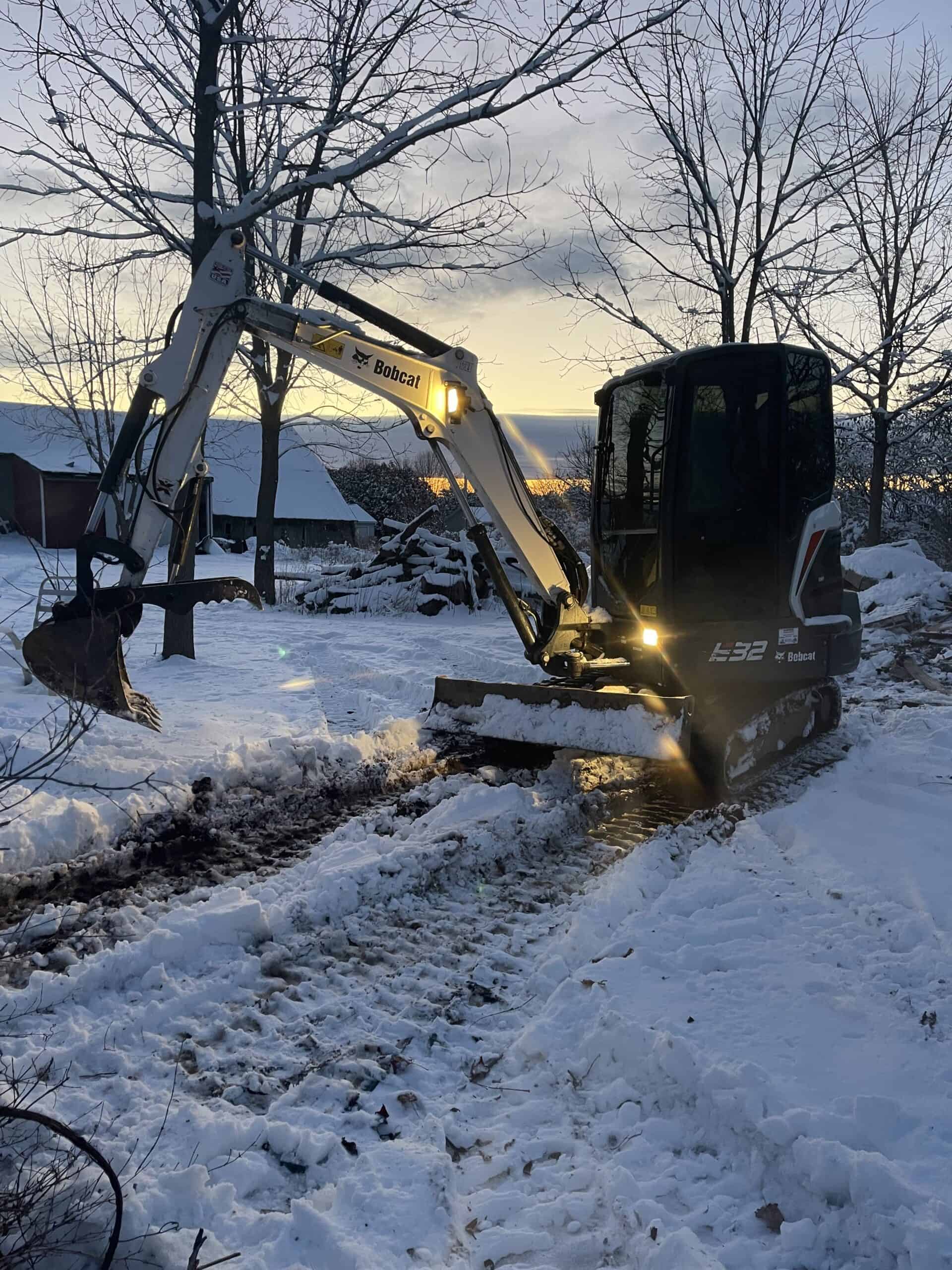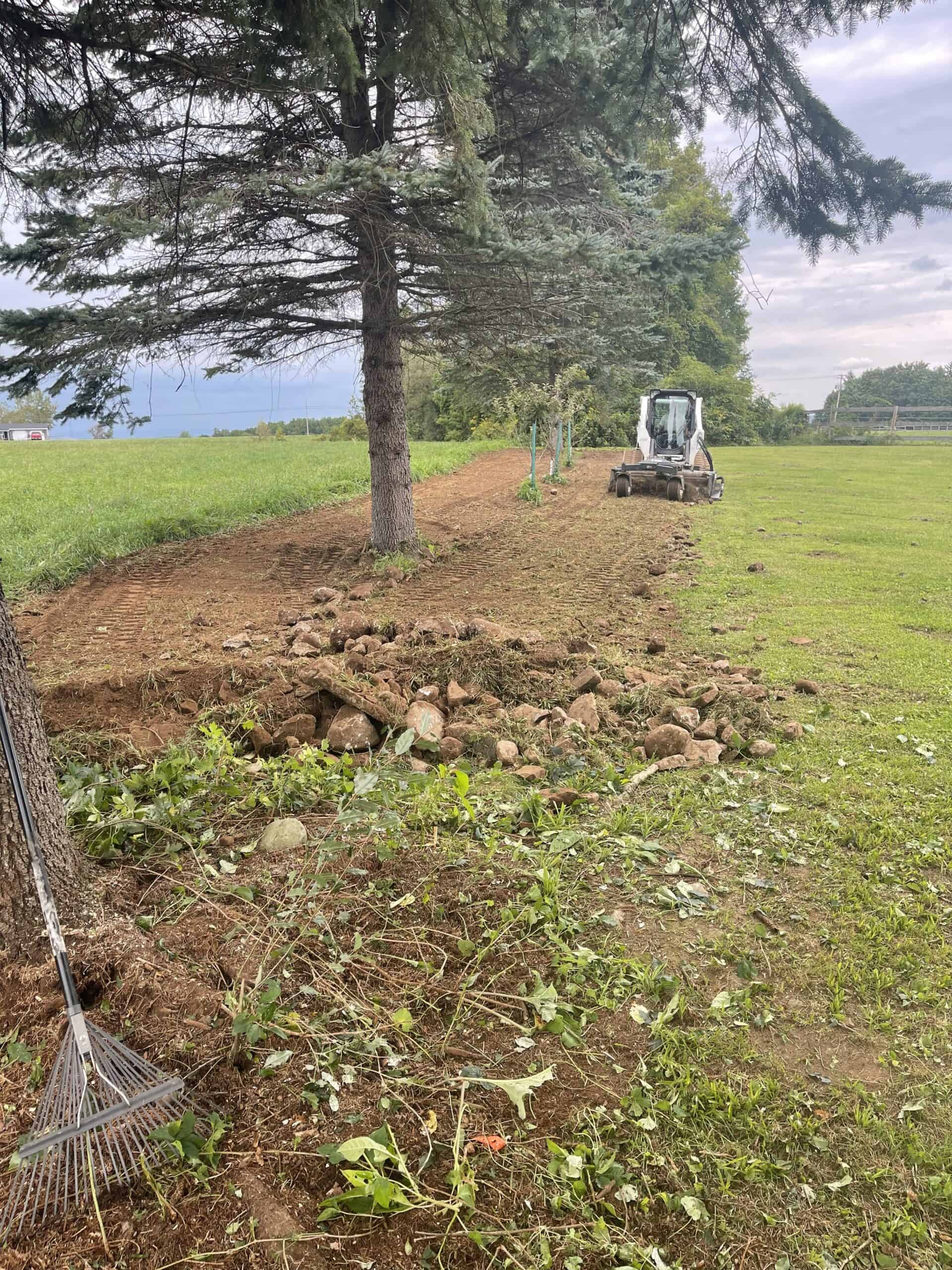Preparing for Home Excavation: Planning, Permits, and Budgeting
Proper preparation for home excavation projects is crucial. Digging up dirt, dislodging rocks, uprooting trees, and moving earth can be time-consuming and require multiple steps. So, how do you position yourself in the best possible spot? We’ll explore the five steps in this blog.
 The Four Steps for Planning an Excavation
Excavation planning means ironing out the details before breaking ground. You must determine and understand the project scope to avoid unpleasant surprises. Whether excavating for a hardscaping project or revamping your property layout, these steps are non-negotiable:
Identify Excavation Goals
Decide how big you need the hole, then calculate your budget accordingly. Consider the expense of navigating around unexpected objects or complying with local laws in New York. Work with a professional team to determine the goals and potential obstacles.
Assess the Complexity and Scale
Discuss project complexity while computing the scale. Discuss safety concerns, define boundaries, and evaluate the available resources. You can also use this time to delegate tasks, break down the workflow, and address labor or supply chain issues.
Consider the Feasibility
Excavation teams might conduct a site assessment and analysis to choose the best approach. Some will also factor in the return on investment (ROI) of different projects to help homeowners decide. They’ll examine alternative ideas and ensure the concept aligns with stakeholder interests.
Research Local Permit Regulations
Be mindful of varying district laws and building regulations. Property owners might need different permits in Clinton than in New Hartford. Double-check with your team to ensure compliance since each project requires unique documentation and oversight from the local authorities.
What You Need to Know About Excavation Permits
Homeowners and businesses cannot dig without a permit from the state of New York and their county. Ground-disturbing activities require a license from the local government. Excavation and hardscaping teams must apply for a permit before doing anything.
Permits are a necessary part of the process, albeit disruptive for some projects. They help local authorities monitor safety and ensure environmental protection. An excavation permit is also essential for complying with building codes and zoning regulations.
What Happens If You Don’t Get a Permit for Excavation?
Failure to get permission for excavation and hardscaping can result in legal trouble or project stoppage. Some NY government agencies might issue fines or penalties for property owners who proceed without a permit. Meanwhile, each jurisdiction has a different procedure, so research expectations with your team.
How to Apply for an Excavation Permit
Your excavator will most likely handle the permit process. However, you can help expedite it by providing detailed information about the project scope, digging methods, site plans, and safety measures. Some NY authorities might also need facts about environmental conditions and impacts.
Excavation permit approvals can take several days or weeks to review and complete. Begin the permit application process early to avoid delays.
Budgeting for Excavation Services: What You Need to Do
Calculating a project budget can help you achieve goals without breaking the bank. Let’s look at the steps you should take to develop a spending plan and stick to it:
The Four Steps for Planning an Excavation
Excavation planning means ironing out the details before breaking ground. You must determine and understand the project scope to avoid unpleasant surprises. Whether excavating for a hardscaping project or revamping your property layout, these steps are non-negotiable:
Identify Excavation Goals
Decide how big you need the hole, then calculate your budget accordingly. Consider the expense of navigating around unexpected objects or complying with local laws in New York. Work with a professional team to determine the goals and potential obstacles.
Assess the Complexity and Scale
Discuss project complexity while computing the scale. Discuss safety concerns, define boundaries, and evaluate the available resources. You can also use this time to delegate tasks, break down the workflow, and address labor or supply chain issues.
Consider the Feasibility
Excavation teams might conduct a site assessment and analysis to choose the best approach. Some will also factor in the return on investment (ROI) of different projects to help homeowners decide. They’ll examine alternative ideas and ensure the concept aligns with stakeholder interests.
Research Local Permit Regulations
Be mindful of varying district laws and building regulations. Property owners might need different permits in Clinton than in New Hartford. Double-check with your team to ensure compliance since each project requires unique documentation and oversight from the local authorities.
What You Need to Know About Excavation Permits
Homeowners and businesses cannot dig without a permit from the state of New York and their county. Ground-disturbing activities require a license from the local government. Excavation and hardscaping teams must apply for a permit before doing anything.
Permits are a necessary part of the process, albeit disruptive for some projects. They help local authorities monitor safety and ensure environmental protection. An excavation permit is also essential for complying with building codes and zoning regulations.
What Happens If You Don’t Get a Permit for Excavation?
Failure to get permission for excavation and hardscaping can result in legal trouble or project stoppage. Some NY government agencies might issue fines or penalties for property owners who proceed without a permit. Meanwhile, each jurisdiction has a different procedure, so research expectations with your team.
How to Apply for an Excavation Permit
Your excavator will most likely handle the permit process. However, you can help expedite it by providing detailed information about the project scope, digging methods, site plans, and safety measures. Some NY authorities might also need facts about environmental conditions and impacts.
Excavation permit approvals can take several days or weeks to review and complete. Begin the permit application process early to avoid delays.
Budgeting for Excavation Services: What You Need to Do
Calculating a project budget can help you achieve goals without breaking the bank. Let’s look at the steps you should take to develop a spending plan and stick to it:

- Start with an excavation service quote. This step will help you determine whether the scope and scale of your project is feasible.
- Review different techniques and outcomes. You’ll get a better idea of how much each step will cost when you compare methods with results.
- Evaluate the site conditions. Determine whether specific obstacles or issues will prolong the schedule or cost more to manage.
- Account for contingencies. Remain flexible to navigate unexpected problems or setbacks during the excavation process.
- Consider environmental factors. Projects that negatively impact the ecosystem might require additional investment to cover fees, penalties, and surcharges.
- Decide the safety measures. Many projects require strict adherence to site safety standards, requiring teams to work around challenges despite the cost.
